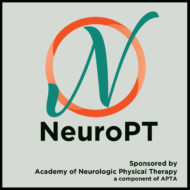Whether you plan to attend in-person or watch on-demand, our host Marissa Lyon highlights an itinerary of education sessions, platform presentations, and poster sessions that will elevate your knowledge of balance training and fall prevention.
Additionally, this month we throw in a few tips on having a successful and lower-stress CSM and eating well in Houston. We finish off with a lightning round of punny, funny, and silly course titles.
Other things going on at CSM everyday: Tranquility room 7-7:30, APTA (free) Head Shot Lounge 9:30-4:00, APTA Fit for Practice Fitness Gym 10:15-4:00, and Exhibit Hall 9:30-4:00
Vertigogo on the Vestibular SIG Instagram
Restaurant recommendations: Huyhn Restaurant, Nancy’s Hustle, St. Arnold’s, Phoenicia Foods, Ninfa’s on Navigation, Fifth Vessel.
Please send comments or questions on this podcast to balancefallssig@gmail.com
The Balance & Falls Special Interest Group is part of the Academy of Neurologic Physical Therapy – www.neuropt.org.
Podcast: Play in new window | Download (Duration: 21:05 — 29.0MB)
